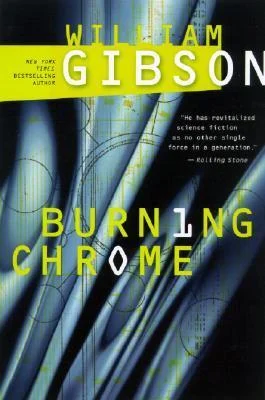Introduction
Burning Chrome Summary And Themes By William Gibson “Burning Chrome” is a science fiction short story written by William Gibson, first published in 1982. It is often considered a seminal work in the cyberpunk genre, one that helped shape the literary and cultural movement that emerged in the 1980s. Set in a dystopian future characterized by neon-lit streets, artificial intelligence, and corporate espionage, the story introduces readers to the concept of cyberspace, which would become central to Gibson’s later works, most notably his 1984 novel Neuromancer.
The story follows two characters, Bobby Newmark, a young hacker, and Jack, a seasoned cybercriminal. Together, they plot to steal a vast fortune from a powerful and dangerous figure named Chrome. Through these characters’ journey, “Burning Chrome” explores the themes of technology, identity, and the commodification of the human mind in a high-tech, cyberpunk world. Gibson’s storytelling in “Burning Chrome” is marked by its vivid descriptions of the digital landscape, its complex characters, and its exploration of the boundaries between the physical and virtual worlds.
Plot Summary of Burning Chrome
“Burning Chrome” begins with the character of Bobby Newmark, a young hacker who goes by the handle “Count Zero.” Bobby lives in a gritty, high-tech urban environment that is filled with corporate interests, crime, and technology. He is trying to establish himself in the hacking community, but he is inexperienced compared to more seasoned hackers. His friend and mentor, Jack, is a veteran of the criminal underworld and a skilled cybercriminal.
Jack and Bobby are planning a heist—a scheme to hack into the systems of a wealthy and powerful individual known as Chrome. Chrome is a dangerous figure in the world of cybercrime, and he controls a vast fortune through his ownership of a powerful, secretive AI program. The two hackers are aware of the risks involved, but they are motivated by the promise of money and power. Their target, Chrome, is a symbol of wealth and technological control in this futuristic world.
The story explores the process of hacking into Chrome’s systems, which involves navigating through the virtual landscape of cyberspace. The hackers are able to break into Chrome’s network and gain access to his virtual vault, a digital representation of his wealth. As they work to steal the fortune, Bobby becomes increasingly immersed in the virtual space, experiencing a kind of digital euphoria as he connects with the data.
However, the heist takes an unexpected turn when Bobby realizes that the consequences of his actions may be far greater than he anticipated. The deeper they go into Chrome’s systems, the more they uncover about the dark side of the technological world they inhabit. In the final moments of the story, Bobby’s realization about the true nature of their crime leads him to question the value of the wealth they sought to steal.
The story ends with a moment of reflection, as Bobby looks back on the experience and contemplates the nature of identity, technology, and the human mind. The heist, while seemingly successful on the surface, leaves Bobby feeling disconnected and disillusioned, a theme that resonates throughout the cyberpunk genre.

Themes in Burning Chrome
1. Cyberspace and Technology
One of the central themes of “Burning Chrome” is the exploration of cyberspace and its relationship to technology. Gibson’s vision of cyberspace as a virtual, interconnected world where information flows freely is a groundbreaking concept that has become a hallmark of the cyberpunk genre. In the story, cyberspace is portrayed as a space that is as real, if not more so, than the physical world. The characters’ ability to navigate cyberspace, hack into systems, and manipulate data demonstrates the power that technology can have over individuals and society.
The story foreshadows the rise of the internet, virtual reality, and the digital world as central aspects of modern life. It explores how technology can shape identity, power dynamics, and human relationships, with the potential for both liberation and control.
Read more
2. The Commodification of the Human Mind
Another prominent theme in “Burning Chrome” is the commodification of the human mind. The story suggests that in the world of cybercrime, human consciousness and identity can be manipulated, bought, and sold. The hackers in the story engage with cyberspace not just to steal money but to access and control a part of Chrome’s mind, represented by his AI program. This reflects the broader theme of technology being used to commodify human intellect and creativity.
Gibson’s portrayal of cyberspace as a place where the mind can be uploaded, manipulated, and controlled explores the dehumanizing potential of technology. In a world where human experience and identity can be digitized and commodified, the line between person and machine becomes increasingly blurred.
3. Identity and Alienation
The theme of identity and alienation is deeply woven into the fabric of “Burning Chrome.” As Bobby navigates cyberspace, he experiences a sense of liberation and disconnection from the physical world. However, this freedom comes at a cost. The virtual world offers a distorted version of reality where people can reinvent themselves or escape from their problems, but this also creates a sense of alienation from one’s true self.
Bobby’s transformation throughout the story reflects his struggle with his own identity. He begins as an eager young hacker, but by the end of the story, he is left questioning the value of the wealth and power he sought. The story highlights the existential consequences of living in a world where technology has made it possible to erase or alter one’s identity.
4. Greed and Corruption
“Burning Chrome” also critiques the greed and corruption that pervade the world of cybercrime and the broader socio-economic landscape. The hackers’ pursuit of Chrome’s fortune represents the endless quest for wealth and power that drives individuals in a society dominated by technology and corporate interests. However, this greed leads to a sense of emptiness and disillusionment, as Bobby realizes that the wealth he sought is ultimately meaningless.
The story suggests that in a world where technology and information are the ultimate forms of power, the pursuit of wealth and status can be an empty endeavor that leaves individuals feeling disconnected from their true selves. The hackers’ actions are a reflection of the broader societal obsession with profit and material gain, often at the expense of personal fulfillment and ethical considerations.
Read more
5. Human vs. Machine
The relationship between humans and machines is another significant theme in “Burning Chrome.” Throughout the story, the characters interact with artificial intelligence and sophisticated digital systems, blurring the lines between human agency and machine control. The AI program that Chrome controls represents the power of technology to shape and control human behavior.
At the same time, the hackers’ attempt to outsmart and manipulate these machines demonstrates the tension between human ingenuity and machine intelligence. The story raises questions about the future of technology and its potential to surpass human capabilities, while also highlighting the dangers of becoming too reliant on machines.

Conclusion
Burning Chrome is a visionary work of science fiction that explores the intersection of technology, identity, and the human condition in a high-tech, cyberpunk world. William Gibson’s portrayal of cyberspace and his exploration of the relationship between humans and machines have had a profound impact on the genre, influencing not only literature but also popular culture and technology.
Through its themes of greed, alienation, and the commodification of the mind, Burning Chrome offers a cautionary tale about the potential consequences of living in a digital age where the boundaries between the physical and virtual worlds are increasingly blurred.
Read more
(FAQ)
1. What does the title Burning Chrome mean?
The title Burning Chrome refers to the act of hacking into a high-tech system, symbolized by the name “Chrome.” “Burning” is a term used in the hacking community to describe the process of breaching or compromising a computer system. The title thus reflects the central act of the story—stealing from the powerful figure Chrome by hacking into his virtual wealth.
2. What is cyberspace in Burning Chrome?
Cyberspace in “Burning Chrome” is a virtual, interconnected space where data and information can be accessed, manipulated, and transferred. It is depicted as a fully immersive digital environment that functions as a parallel reality to the physical world. Gibson’s portrayal of cyberspace in the story prefigures the internet and virtual reality, offering a vision of a digital landscape where human consciousness and data can converge.
3. What is the significance of Bobby’s transformation in the story?
Bobby’s transformation represents his journey from youthful idealism to a more disillusioned understanding of the world. Initially eager to prove himself in the world of hacking, Bobby becomes increasingly disillusioned with the consequences of his actions, especially when he realizes the emptiness of the wealth he sought. This transformation underscores the story’s exploration of identity, alienation, and the dehumanizing effects of technology.
4. What role does Chrome play in the story?
Chrome is the antagonist in “Burning Chrome.” He is a powerful figure in the world of cybercrime who controls vast wealth through a sophisticated AI program. Chrome represents the ultimate goal of the hackers—wealth, power, and control. However, he is also symbolic of the corruption and greed that pervade the story’s digital world, as well as the commodification of human consciousness.
5. How does Burning Chrome critique technology?
“Burning Chrome” critiques technology by highlighting its potential to alienate individuals and commodify human identity. While technology provides opportunities for power and liberation, it also raises questions about human agency and ethical responsibility. The story suggests that in a world driven by technology, the pursuit of wealth and control can lead to disillusionment and a loss of connection to what is truly meaningful in life.
Read more
















